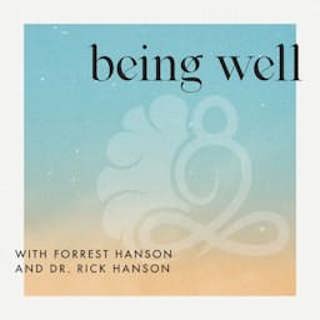
Reducing Reactivity (Without Becoming a Doormat) with Sharon Salzberg
What is mindfulness really? According to one fourth-grader, "Not hitting someone in the mouth." Legendary meditation teacher Sharon Salzberg joins Rick and Forrest to discuss how we can work skillfull...
9 Feb 1h 10min

Fixing vs. Feeling: How to Get on the Same Team with Elizabeth Ferreira
Forrest and somatic therapist Elizabeth Ferreira explore a common source of relationship conflict: the mismatch between “fixing” (moving quickly into problem-solving) and “feeling” (wanting attunement...
2 Feb 1h

How to Create a Meaningful Life with Brad Stulberg
Top performance coach and author Brad Stulberg joins Forrest to reframe and reclaim excellence. Brad explains how real excellence - involved engagement with something you care about - is the healthy m...
26 Jan 1h 23min

Is Self-Help a Cult? The Attention Economy and Slippery Slope of "Woo"
Forrest and Dr. Rick explore how well-intentioned self-help advice can drift away from science under the incentives of the attention economy, where overclaiming, alarmist framing, and “this one simple...
19 Jan 1h 35min

How to Make 2026 a Year You’ll Love
Dr. Rick and Forrest explore how we can put our key values into action in 2026. They discuss how we can identify authentic values, and then translate them into goals and daily behaviors while reducing...
12 Jan 1h 11min

Who You’ll Be This Year: Values, Goals, and a Different Kind of Resolution
In this New Year’s episode, Dr. Rick and Forrest make the case that most resolutions fail because they focus on the wrong things: outcomes and behaviors rather than key values. They explore how we can...
5 Jan 1h 7min

Against Nonchalance: How to Embrace Caring in 2026
Not caring - or nonchalance - is having a cultural moment. Nihilism is in, trying too hard is cringe, and the best way to cope with an often disappointing world is by not getting that invested. There’...
29 Dec 20251h 11min

Resentment, Situationships, and Highly Sensitive People: December Mailbag
Dr. Rick and Forrest open up the mailbag to answer listener questions about resentment, highly sensitive people, situationships, and expanding the window of tolerance. In the first three questions, th...
22 Dec 20251h 3min






















